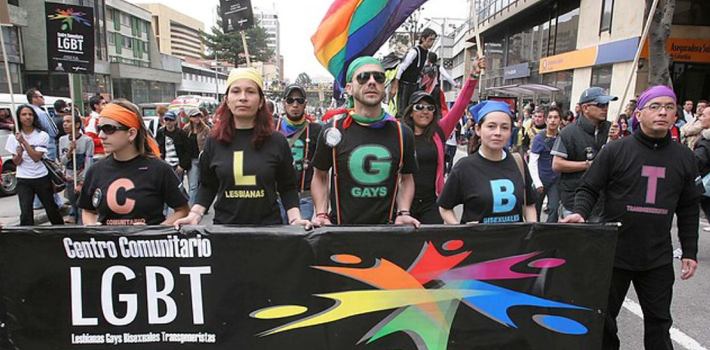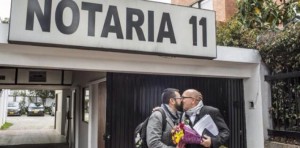
EspañolThe recent US Supreme Court decision to legalize gay marriage at the federal level has reactivated a long-delayed debate in the Colombian Congress. Has the time come for same-sex marriage to be authorized in the South American nation?
“The US Supreme Court has showed that the courts can play this role [of approving gay marriage]. If there was any doubt that legislative bodies are not the only ones to decide on this issue, the US Supreme Court has shown that when parliaments do not act, the courts have a crucial role to play,” said Marcela Sánchez, head of Colombia Diversa, an NGO devoted to defending LGBTI rights.
In Colombia, the issue of “equal marriage” — as its known within the LGBTI community — is in a state of legal limbo. In 2013, the Constitutional Court ruled that a gay couple had a right to marry, despite there being no law that expressly authorizes it.
This court decision has driven public notaries to perform so-called solemn unions, a type of civil-union contract. However, the LBTI community has argued that these unions do not grant the necessary legal rights to form a family.
“This civil contract that the public notaries created does not exist in the Colombian legal system. We have discouraged people from signing it, because we don’t know what rights it grants, how it is terminated, or who will resolve disputes,” Sánchez explains. “It’s much better for a couple to have a judge marry them or declare a civil partnership.”
This “contract” offered by notaries reflects the current debate in Colombia. When the court recognized that same-sex couples have the right to form a family, it set a deadline for Congress to pass a law. The debate has since stalled, but judges and notaries are still within their legal rights to perform same-sex marriages.
“It’s unbelievable that congressmen are still abiding by Article 42 of the Constitution [that defines a family as the union between a man and a woman], when the Constitutional Court has ruled that a same-sex couple is a family and [gay] marriage is not banned in the country and only lacks regulation,” says Sánchez, who believes the problem is primarily a lack of political will.
“Congressmen have been authorized to legislate, but if they don’t even read what the court wrote, it will very hard to have an honest and practical discussion in Congress.”
Winds of Change
Even without Congress’s approval, there are legal precedents that indicate gay marriage in Colombia could soon become in a reality. Following the Supreme Court decision in the United States, the Colombian Constitutional Court has set public hearings to reignite the debate. The administration’s shift in support of the court’s decision to move forward on gay marriage has been met with mixed reactions across the political spectrum.

“Equality is unstoppable, and equality will also arrive in Colombia,” Colombian Interior Minister Juan Fernando Cristo said on Gay Pride day. “I recognize the effort led by the Constitutional Court to approve gay marriage, although the task is far from being complete and it is still necessary to take further steps to authorize same-sex marriage and adoption.”
Last year, the Constitutional Court ruled that a gay couple could adopt a child, because one of them was the biological mother, allowing other same-sex couples in the same situation to also adopt. The decision opened the door for equal adoption rights for gay couples, but the court ultimately ruled against homosexuals adopting children who are not their offspring earlier this year.
Furthermore, in June, the government issued a decree allowing transgender people to change their gender on their birth certificates and national IDs, without any additional medical proof or requirement, other than the request itself.
Will Gay Marriage Be Opposed?
According to Colombia Diversa, there have always been opponents to gay marriage in Colombia, and this time won’t be any different. In 2013, the organization claimed the Attorney General’s Office sought to persecute the LGBTI community by requesting the annulment of pensions for same-sex couples and the adoption of a child by a gay father.
“The Attorney General’s Office boycotts the proceedings and the dignity of LGBTI people when the court moves toward recognizing [same-sex marriage],” Sánchez says. “They use the entire legal apparatus to keep people from exercising their rights. They force citizens who want the same rights as the rest of the population to waste time, money, and the court’s resources.”
Javier Suárez, with the Husband and Wife Foundation, said that the organization is leading a campaign to repeal the executive decree that grants transgender people the right to change the gender listed on their national ID card.
“This would open the door for unlawful behavior. For instance, people being sought by authorities can simply declare they are homosexuals and request a new national ID to switch genders … I can imagine many FARC guerrilla members running to declare themselves homosexuals,” he says.
Suárez has led the efforts to annul two of the tree same-sex marriages performed in the country, and has lashed out publicly against the judges and notaries officiating them. While there has always been political and social opposition to same-sex marriage and adoption, Suárez acknowledges this that time it’s closer to becoming a reality.
Suárez says he will fight with all the tools available to him to keep it from happening. In fact, he says he’s even asked Pope Francis to help provide the Constitutional Court and Congress with “guidance” to “make the right decision.” He believes allowing homosexuals to raise a child would violate the child’s rights, and worries same-sex couples would “train” their children to be gay.
The US Supreme Court has set a “very bad example” for the rest of the Americas, he says. According to Suárez, the US decision encourages courts in other countries to overstep their bounds, “as in the case of Colombia.”
“The way the LGBTI community behaves is disgraceful. They lobby judges, people close to the president, and the Congress,” says Suárez, referring to the two lesbian senators currently in office. “All this with the singular goal of having these things approved through political or judicial means based on equality.”
For her part, Marcela Sánchez trusts the work of Colombia Diversa and the LGBTI community to have equal rights recognized for all.
“Not only is the court prepared, but some judges have already taken steps [toward equality] and [homosexual] couples themselves are gaining visibility: people are ‘coming out of the closet,‘ taking to the streets, and showing themselves as they are. This will lead to full recognition from society, and then, from the government.”
 Versión Español
Versión Español












